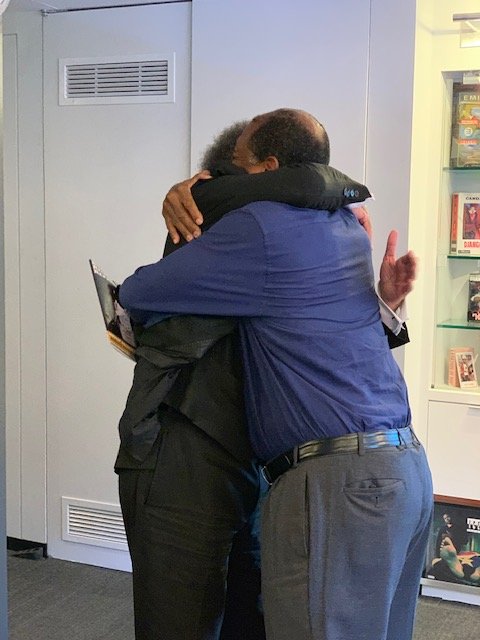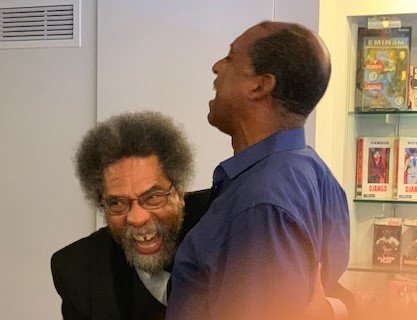The Day I Confronted Cornel West
Finally. For years I had wanted to tell Cornel West something right to his face, man to man, in the spirit of antagonistic cooperation. In September 2019, I got a chance to take my shot.
West’s Debt to Ralph Ellison and Albert Murray
I’d spoken with him in person a few times. The first instance was in the late 1990s, when I studied in NYU’s American Studies graduate program. West was speaking at Columbia University in a classroom full of undergrads and graduate students.
During the Q&A, I asked him his thoughts on Ralph Ellison.
“He’s a high-brow aesthete!” West thundered. I made a mental note.
Just a few years later, West said the following within the first minute of Avon Kirkland’s 2002 documentary, Ralph Ellison: An American Journey:
“He has a fundamental respect for the complex minds of everyday, ordinary black people. And I love that about Ellison.”
Two more minutes in, West says—with customary gravitas—that “it’s impossible to be a serious student of American culture and Afro-American culture without working through Ellison. He’s the brook of fire through which one must pass.”
It’s fair to say that as regards Ellison, West, based on the quotes above, is of two minds.
In 2008, West was featured in another documentary, Examined Life, which featured eight influential contemporary philosophers walking around New York and other cities discussing the practical application of their ideas today. I attended the movie premiere at the Film Forum in Greenwich Village with Jewel.
As fate would have it, Cornel was in the lobby. I shook his hand and asked: what do you think of Albert Murray?
“Oh, the great Albert Murray!,” West intoned.
But afterword on stage, and during his portions of the film, he only mentioned great European and Euro-American thinkers and writers by name. Since I’m what Ellison called a “little man at Chehaw Station,” I know the blues idiom tradition. I’m an inheritor of its riches, culturally and intellectually. So when Cornel West riffs on the tradition, I can hear its derivation as clearly as listening to a jazz musician whose influences on his or her instrument are as clear as day to those in the know.
Ever since reading Race Matters in 1995, I’ve wondered why West assiduously avoids going into detail about the work and thought of what I call the Ellison-Murray Continuum. He’s aware of that Black American trajectory of thought, clearly, as he riffs on it all the time.
For instance, while in a cab driving along the streets of the Big Apple for the documentary Examined Life, West explained:
I’m a blues man in the life of the mind, a jazz man in the world of ideas. So, therefore for me music is central. So when you’re talking about poetry, for the most part when Plato is talking about poetry, you’re mainly talking about words. Whereas I talk about notes, tone, timbre. I talk about rhythms. See, for me, music is fundamental. Philosophy must not only go to school with the poets, but with the musicians . . . . My kind of blues begins with catastrophe, begins with the angel of history . . . with the pileage, the wreckage, one piled on another. That’s the starting point. The blues is personal catastrophe lyrically expressed. And [for] black people in America and in the modern world, given these vicious legacies of white supremacy, it is: how do you generate an elegance of earned self-togetherness so that you have a stick-to-it-ness in the face of the catastrophic, and the calamitous, and the horrendous, and the scandalous, and the monstrous.
You can see the whole 13 minutes of West’s brilliant commentary here.
The passages that I’ve highlighted above is evidence of West’s awareness of the ideas of Ellison and Murray. The first, describing the blues as “personal catastrophe lyrically expressed” comes from Ellison’s 1945 essay, “Richard Wright’s Blues.” The phrase “elegance of earned self-togetherness” is a Murray statement from Stomping the Blues, published in 1976, when West was studying for his doctorate in philosophy at Princeton University.
The Moment of Truth
On Tuesday, September 17, 2019, I had the chance to speak with Professor West yet again. To me, and perhaps to him, it was a moment of truth.
Frank Stewart and Fred Moten
The occasion was a discussion between photographer Frank Stewart and scholar Fred Moten about Frank's jazz photo exhibit at the Cooper Gallery. Henry Louis "Skip" Gates Jr., Director of the Hutchins Center, presided over the event. When Professor West walked in, clad in his black three-piece suit and huge afro, I was pleasantly surprised.
Later he told me, "Brother, I had to rearrange some of my plans once I heard that Fred [Moten] would be here. Fred’s a genius."
I knew what he meant. Having taken a Performance Studies class with Prof. Moten in the late '90s at NYU, around the time I first spoke with West, and having discussed music and ideas with Fred privately, as well as studying his poetry and his scholarship, I knew of Fred's genius first-hand.
Which is why after the event, the first info I shared with Cornel was that I had featured Fred and Vijay Iyer as guests for my adult ed class at Jazz at Lincoln Center that spring, "The Art & Science of Improvisation." I added that Stephon Alexander and Brandon Ogbunu of Brown U. were guests on the physics and evolutionary biology tip.
He told me he had to run, so I put my right hand on his shoulder, looked him in his eyes, and said:
"Brother West. I understand why in these times you're an activist. But . . . WE NEED YOUR BOOK ON CHEKHOV AND COLTRANE."
He moaned and looked down.
"It's an ANCESTRAL IMPERATIVE."
"Yes, yes, brother, we must get to that."
"I say this as an Ellison-Murray man."
"We love them too."
Then he thanked and hugged me, and we had a good laugh before he jetted.
West’s Debt to Chekhov and Coltrane
See, nearly 25 years ago, he opened The Cornel West Reader with a epigraph featuring one quote by Anton Chekhov, and a statement by John Coltrane. He ended the 600-page collection with a Postscript, which began:
"My next long-term project is a meditation on [Anton] Chekhov and [John] Coltrane that delves into the distinctive conceptions of the tragic in American civilization and of the comic in Russian civilization--the two most influential and bewildering civilizations of modernity for the twentieth century."
The interview that followed, with scholar David L. Smith, was titled, "Chekhov, Coltrane, and Democracy." As perhaps one of the greatest minds of his generation, such a book could be West’s crowning intellectual achievement.
Thanks to Jewel Kinch-Thomas and cousin Shaynah Barnes for capturing my last encounter with Professor Dr. Cornel West.







